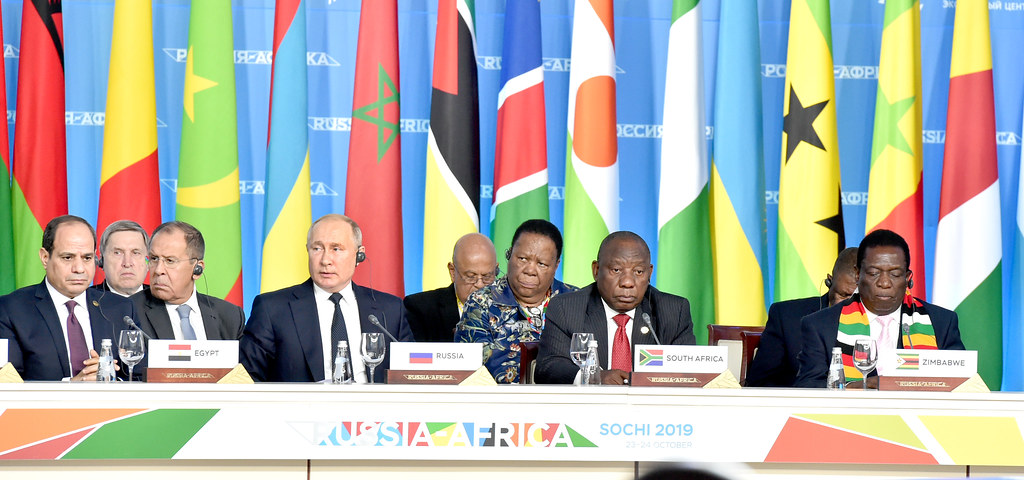 2019 Russia-Africa Summit by GovernmentZA
2019 Russia-Africa Summit by GovernmentZA
The Rise of Great Power Influence in Africa
The incoming Biden Administration has pledged to renew a “mutual respectful engagement” towards Africa through the restoration of diplomatic relations with African governments. The President-elect’s policy agenda for Africa sharply contrasts that of current President Donald Trump, whose “America First” rhetoric, skepticism of foreign involvement, and blatant disrespect has damaged relations with African governments and regional organizations like the AU.
Home to an abundance of natural resources and many of the world’s fastest growing economies, Africa is rising in strategic relevance and has become the playing field for Great Power competition. Beijing and Moscow’s increasing economic, political, and military activity pose a threat to American influence on the continent. Engagement in Africa should be at the forefront of U.S. grand strategy in order to combat malign engagement and reassert its commitment to promoting peace, prosperity, democracy, and governance in the continent.
China
China has become Africa’s most important economic partner after rapid expansion of bilateral trade and foreign direct investment (FDI) across the continent. China-Africa trade reached $192 billion in 2019, and annual FDI flows to Africa have surpassed those of the U.S. since 2014. Chinese State-Owned Enterprises (SOEs) have embarked on massive infrastructure projects to develop dams, railways, ports, and telecommunication networks in order to establish manufacturing and natural resource extraction hubs across the continent. Most well-known is China’s infamous Belt and Road Initiative (BRI) which aims to connect Africa to Southeast Asia and Europe in order to expand maritime trade through a variety of infrastructure and development projects.
Over the past two decades controversial loaning practices and the implementation of debt-trap diplomacy have dramatically increased; Chinese state-owned banks are issuing significant loans to poor African countries, often controlling strategic assets like resources and access rights if debts are not repaid.
Russia
Since 2010 Russia has become increasingly involved in African affairs, exploiting power vacuums across the continent to expand its sphere of influence. The 2019 Russia-Africa Summit secured various trade deals and development projects in the areas of agriculture, industry, infrastructure and military cooperation. Russian interest in the continent is driven in part by the vast opportunity Africa presents in raw material and natural resource extraction, as well as energy and power development. What sets Moscow apart from Beijing is its strengthening of defense relationships across the continent. As China remains the supreme financial powerhouse in Africa, Russia has chosen to advance its military influence and exploit power vacuums for profit.
In the past six years Russia has signed military cooperation agreements with over 20 African countries and has become the largest supplier of arms to the continent. Russian companies have also contributed troops to unstable countries and led training programs for autocratic leaders and non-state actors. Most well-known is the Wagner Group, a private Russian military contractor used by the Russian state to further interests in Africa. Wagner has been present in the Libyan conflict since 2018 and has contributed fighters, weapons, and funding on behalf of warlord Khalifa Haftar.
Moscow’s military support of dictators, rebels, and insurgent groups maintains a cycle of insecurity in Africa, undermining American interests of establishing democracy and stable governance. Russian military forces have also become increasingly present in African states’ fight against terrorism. In 2018 five Sub-Saharan African countries came to Moscow for security assistance in their fight against the Islamic State and Al Qaeda, and Wagner has assisted local security forces in Mozambique to combat insurgencies. As the U.S. retreats from its long-standing engagements against Islamic insurgencies in failed and fragile African states, Russia has stepped in to fill the gap.
Conclusion
The Trump Administration’s focus for Africa largely maintained status-quo policies used by his predecessors. Its signature Prosper Africa Initiative has focused on expanding trade and American business throughout the continent which has proven constructive in countering China’s ever-increasing economic influence. Washington’s condemnation of Beijing’s predatory lending practices is a first step, but a more comprehensive strategy is needed to ensure African countries are not exploited. America’s retreat from its fight against violent extremism in Africa has allowed malign actors like Russia to fill military and security gaps. The Biden Administration should reaffirm the U. S’s commitment to counterterrorism initiatives and restrain Russian military influence in fragile African countries. Balancing both economic investment and security objectives in Africa is crucial to rebuilding America’s reputation as a respectful and trustworthy partner. As great power competition on the continent becomes increasingly multidimensional, diplomatic, military, and economic engagement will be crucial to reinserting influence and combating destructive forces.





